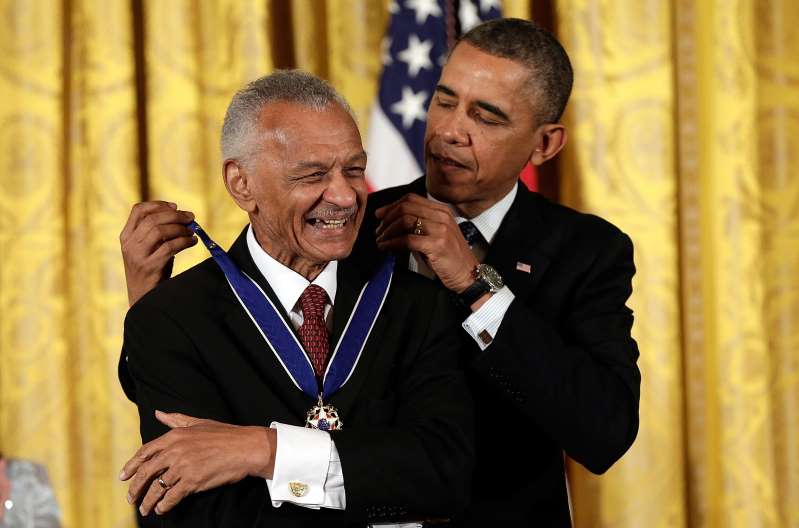
By Danny R. Johnson
WASHINGTON–C.T. Vivian, the late civil rights activist and close adviser to Martin Luther King Jr., was remembered last Thursday in a private funeral service Atlanta as a fearless warrior for human rights. Well-wishers from all walks of life praised Vivian as a monumental figure in the Civil Rights Movement, with a stretch of advocating for racial equality for more than six decades from his first sit-in demonstrations in the 1940s in Peoria, Illinois. He met Dr. Martin Luther King, Jr. soon after the 1955 Montgomery bus boycott.
Vivian died of natural causes July 17 at age 95 at his home in Atlanta. It was the same day that fellow civil rights leader U.S. Rep. John Robert Lewis died.
Cordy Tindell Vivian was born July 28, 1924, in Howard County, Mo., but moved to Macomb, Ill., with his mother when he was still a young boy.
As a young theology student at the American Baptist College in Nashville, Tenn., Vivian helped organize that city’s first sit-ins, and later participated in the Freedom Rides in Mississippi. Under King’s leadership at SCLC, Vivian was national director of affiliates, and after King’s death in 1968, he continued to serve the organization.
Though already a veteran of the movement, Vivian returned to lead the SCLC in 2012 as its interim president. Some saw his return to leadership as lending renewed credibility and a tangible link to the era after the SCLC stagnated for years due to financial mismanagement and infighting.
Here are five things to know about Vivian.
1. Vivian first led a sit-in in 1947
While working in his first professional job as a recreation director for the Carver Community Center in Peoria, Illinois, Vivian led his first-ever sit-in.
The demonstrations aimed to desegregate Peoria’s Barton’s Cafeteria and served as a pivotal moment in Vivian’s career as an activist, marking the first time he used non-violent, direct-action movement to spur change. It would not be the last time he would do so.
While studying at American Baptist College in Nashville, Vivian teamed with future civil rights leaders Diane Nash, Bernard Lafayette, James Bevel, James Forman and John Lewis – who would go on to become a congressman – for a non-violent march. On April 19, 1960, Vivian was one of around 4,000 demonstrators who marched on City Hall in Nashville and persuaded then-Mayor Ben West to publicly agree that racial discrimination was morally wrong.
2. Vivian participated in Freedom Rides, marched in Selma
Vivian participated in the Freedom Rides to Mississippi in 1961 as a member of the Southern Christian Leadership Conference. Upon arriving in Jackson, Mississippi, Vivian was arrested.
Two years later, King appointed Vivian the national director of affiliates of the SCLC.
Then, in an incident Vivian is perhaps best known for, Vivian challenged Sheriff Jim Clark on the steps of the courthouse in Selma, Alabama, in 1965 during a drive to promote Black people to register to vote.
“You can turn your back on me, but you cannot turn your back upon the idea of justice,” Vivian said to Clark as reporters recorded the interaction. “You can turn your back now and you can keep the club in your hand, but you cannot beat down justice. And we will register to vote, because as citizens of these United States we have the right to do it.”
The footage shows Clark striking Vivian, who falls to the ground. Vivian is seen gathering himself and standing, before continuing his argument.
Shortly after the incident on the courthouse steps, thousands marched from Selma to Montgomery, Alabama, to bring awareness to racial inequities. And by the end of the year, Congress would pass the Voting Rights Act of 1965.
3. King called him ‘the greatest preacher to ever live’
Dr. Martin Luther King Jr. once described Vivian, one of his closest advisers and confidants in the non-violent movement for racial equality, as “the greatest preacher to ever live.”
After Vivian left King’s organization, he went on to write “Black Power and the American Myth,” the first book about the civil rights movement to be published by one of King’s aides.
“It was Martin Luther King who removed the Black struggle from the economic realm and placed it in a moral and spiritual context,” Vivian wrote in his book. “It was on this plane that The Movement first confronted the conscience of the nation.”
Vivian advised Presidents Lyndon B. Johnson, Jimmy Carter, Ronald Reagan, Bill Clinton and Barack Obama on civil rights issues.
4. Vivian was awarded the Presidential Medal of Freedom In 2013, Obama honored Vivian with the Presidential Medal of Freedom. The nation’s highest civilian honor, it is given to those who have made “meritorious contributions to the security or national interests of the United States, to world peace, or to cultural or other significant public or private endeavors.” Vivian was honored Nov. 20 of that year alongside 15 others, including former President Bill Clinton, broadcaster Oprah Winfrey, journalist Ben Bradlee and feminist and author Gloria Steinem.
“The Baptist minister C.T. Vivian was one of Dr. Martin Luther King Jr.’s closest advisers,” Obama said Nov. 20, 2013, during the ceremony. “Martin taught us, he says, that it’s in the action that we find out who we really are. And time and again, Rev. Vivian was one of the first to be in the action.”
5. Vivian created program that later became Upward Bound
The year after his work to promote Black voter registration in Selma, Alabama, Vivian designed, organized and launched VISION in the summer of 1966, an educational program that helped 700 students in the state to attend college on scholarships. VISION later became Upward Bound, a national program run through the U.S. Department of Education that supports high school students from low-income families and those in which neither parent holds a college degree. Upward Bound offers support to help those students graduate from high school and pursue college educations.
“He has always been one of the people who had the most insight, wisdom, integrity and dedication,” said Andrew Young, former Ambassador to the United Nations and mayor of Atlanta, who also worked alongside King.
The late Rosa Parks, who was sitting on a bus in Montgomery, Alabama in December 1955, and refused to give up her seat to a White man, said this about her experience: “People always say that I didn’t give up my seat because I was tired, but that isn’t true. I was not tired physically…I was not old and was 42 at the time…No, the only tired I was, was tired of giving in.”
Vivian was part of a long thread of freedom fighters who refused to give in and led a loyal opposition that was reflected in the national mood at the time. Those loyal oppositional freedom fighters included the likes of Harriet Tubman, Frederick Douglas, Coretta Scott King, Bayard Rustin, Fannie Lou Hammer, Aaron Henry, Stokely Carmichael, Ella Baker, Ida B. Wells, James Meredith, and Medgar Evers.
Vivian, along with King and the thousands who supported the 1960s Civil Rights Movement, showed the nation from Montgomery to Selma that the cancer of racial bigotry had infected America’s cherished democratic and moral traditions. These brave men and women showed us that when days grow dark and nights grow dreary, we can be thankful that our God combines in his nature a creative synthesis of love and justice, which will lead us through life’s dark valleys and into sunlit pathways of hope and fulfillment.








